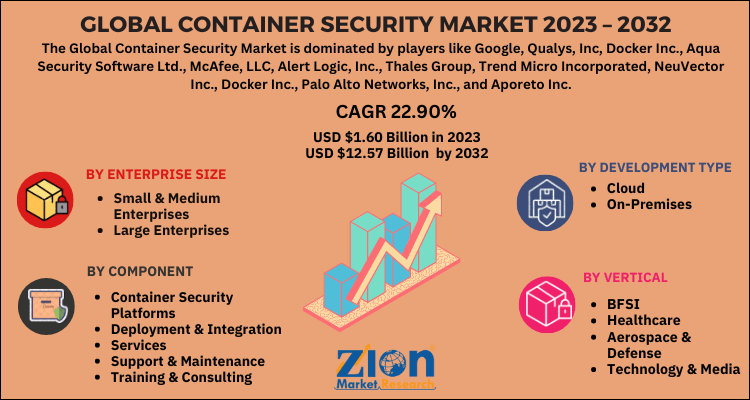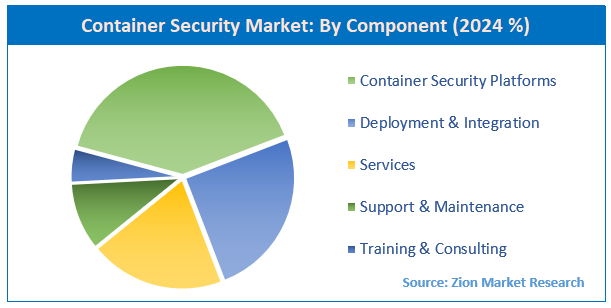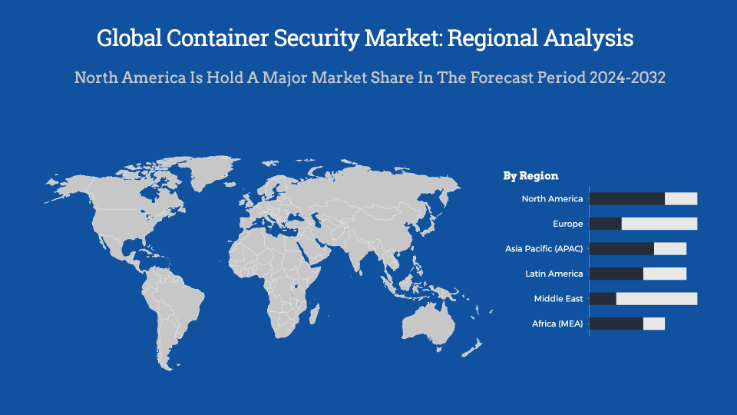Container Security Market Growth, Size, Share, Trends, and Forecast 2032

Container Security Market By component (container security platforms, deployment & integration, services, support & maintenance, and training & consulting), By development type (cloud & on-premises), By enterprise size (small & medium enterprises and large enterprises), By vertical (BFSI, healthcare, IT & telecommunication, aerospace & defense, technology & media, and others) And By Region: - Global And Regional Industry Overview, Market Intelligence, Comprehensive Analysis, Historical Data, And Forecasts, 2024-2032
| Market Size in 2023 | Market Forecast in 2032 | Growth Rate (in %) | Base Year |
|---|---|---|---|
| USD 1.60 Billion | USD 12.57 Billion | CAGR at 22.90% | 2023 |
Description
Global Container Security Market: Insights
According to the report published by Zion Market Research, the global Container Security Market size was valued at USD 1.60 Billion in 2023 and is predicted to reach USD 12.57 Billion by the end of 2032. The market is expected to grow with a CAGR of 22.90% during the forecast period. The report analyzes the global Container Security Market’s growth drivers, restraints, and impact on demand during the forecast period. It will also help navigate and explore the arising opportunities in the Container Security Market industry.
Key Insights:
- As per the analysis shared by our research analyst, the container security market is anticipated to grow at a CAGR of 22.90% during the forecast period (2024-2032).
- The global container security market was estimated to be worth approximately USD 1.60 billion in 2023 and is projected to reach a value of USD 12.57 billion by 2032.
- The growth of the container security market is being driven by increasing need to safeguard cargo across global supply chains against theft, tampering, and unauthorized access.
- Based on the component, the container security platforms segment is growing at a high rate and is projected to dominate the market.
- On the basis of development type, the cloud segment is projected to swipe the largest market share.
- In terms of enterprise size, the small & medium enterprises segment is expected to dominate the market.
- Based on the vertical, the BFSI segment is expected to dominate the market.
- By region, North America is expected to dominate the global market during the forecast period.
Global Container Security Market: Overview
A container is a standard package of software. It bundles an application code along with the associated libraries and configuration files as well as the dependencies that are required to run the application. This enables IT professionals and developers to effortlessly deploy the applications. Container security provides security to such containers to ensure they are running as planned including software supply chain, infrastructure protection, runtime, and many more. Such a security platform also offers enhanced transparency as well as complete visibility into the container activity. This helps to identify threats & vulnerabilities and execute appropriate regulatory policies.
Global Container Security Market: Growth Factors
The rising number of threats and cyber-attacks, growing demand for microservices, and rising adoption of digital transformation are some of the key factors that are fueling the growth of the global container security market. Moreover, the rising number of open-source vendors that provides container security platform is also contributing to the growth of the market. In addition to this, there is growing acceptance of cloud-based technologies by small & medium as well as large enterprises. Also, there is a great demand for cloud computing which includes cloud security, hybrid cloud solutions, and cloud services & solutions like IaaS, SaaS, and PaaS.
Moreover, the IT processes have also become more responsive and innovative with the development and migration of the applications to the cloud. Considering all these factors, there is a huge demand for container security which is ultimately driving the growth of the global market. Additionally, adherence to several regulations & compliances and a rising number of new players due to progressions in ready security and compliance platform is also spurring the growth of the global market. Furthermore, the increasing investments by the major players in R&D for better innovations and technological advancements may lead to good opportunities for the growth of the market during the forecast period. However, lack of technical expertise, as well as the lack of knowledge about container security and technologies, may restrain the growth of the global container security market.
The covid-19 pandemic has resulted in the strict lockdown in most of the countries. Offices are been shut down and the employees are working from home during the pandemic. Around 80 percent of the organizations have implemented a work from home rule for their employees and around 20 to 30 percent of the offices may continue to work from home in 2021 as well. This has resulted in the transition of network utilization. Moreover, there is increased data in motion through emails, video conferencing, and remote applications that have resulted in the overloading of critical infrastructure. Furthermore, there is also an increase in cyber-attacks and vulnerabilities. Thus, the ability of the container security platform to provide vulnerability management and runtime protection to the cloud workload is resulting in the huge demand for container security thereby boosting the growth of the global container security market.
Recent Development
- In May 2025, Docker, Inc.®, a leading provider of cloud-native application development tools, today announced Docker Hardened Images (DHI). This new offering is a curated catalog of security-hardened, enterprise-grade container images designed to address the most challenging software supply chain challenges.
- In October 2023, AO Kaspersky Lab launched Kaspersky Container Security (KCS), a comprehensive solution for securing containerized environments. KCS protects containerized applications throughout their development and operational phases. The solution is designed for ease of use, with a low-cost, simple deployment process that integrates seamlessly into existing IT infrastructures.
- In June 2022, Aqua Security, a pure cloud-native security provider, announced the general availability of its runtime security for customers modernizing infrastructure and applications with Red Hat OpenShift on IBM Power Systems. This enables IBM Power's customers to use Aqua's runtime technology to protect their Red Hat OpenShift container workloads against cloud-native attacks throughout their entire lifecycle.
Container Security Market: Report Scope
| Report Attributes | Report Details |
|---|---|
| Report Name | Container Security Market Research Report |
| Market Size in 2023 | USD 1.60 Billion |
| Market Forecast in 2032 | USD 12.57 Billion |
| Growth Rate | CAGR of 22.90% |
| Number of Pages | 201 |
| Key Companies Covered | Google, Qualys, Inc, Docker Inc., Aqua Security Software Ltd., McAfee, LLC, Alert Logic, Inc., Thales Group, Trend Micro Incorporated, NeuVector Inc., Docker Inc., Palo Alto Networks, Inc., and Aporeto Inc. |
| Segments Covered | By Component, By Development Type, By Enterprise Size, By Vertical And By Region |
| Regions Covered | North America, Europe, Asia Pacific (APAC), Latin America, Middle East, and Africa (MEA) |
| Base Year | 2023 |
| Historical Year | 2018 to 2022 |
| Forecast Year | 2024 - 2032 |
| Customization Scope | Avail customized purchase options to meet your exact research needs. Request For Customization |
Global Container Security Market: Segmentation
The global container security market is bifurcated based on component, development type, enterprise size, vertical, and region. All the segments have been analyzed based on present and future trends and the market is estimated from 2024 to 2032.
Based on the Component, the global container security market is bifurcated into container security platforms, deployment & integration, services, support & maintenance, and training & consulting.
The Development Type Segment is further divided into cloud & on-premises.
Based on the Enterprise Size, the market is split into small & medium enterprises and large enterprises.
The Vertical Segment is Segmented into BFSI, healthcare, IT & telecommunication, aerospace & defense, technology & media, and others.
The Regional segment includes the current and forecast demand for North America, Europe, Asia Pacific, Latin America, and the Middle East and Africa.
Container Security Market Dynamics
Key Growth Drivers
The Container Security Market is primarily driven by the rapid and widespread adoption of cloud-native technologies and containerization across all enterprise sizes. As companies embrace DevOps and microservices architectures to accelerate application development and deployment, containers have become a foundational technology. However, this shift also introduces a new and expanded attack surface that traditional security solutions are not equipped to handle. The growing awareness of this vulnerability, along with an increasing number of sophisticated cyberattacks targeting containerized environments, is compelling organizations to invest in specialized security tools. Furthermore, the global push for DevSecOps, which integrates security into every stage of the software development lifecycle, is a major catalyst for the market, as container security solutions are essential for this "shift-left" security approach.
Restraints
Despite the clear demand, the Container Security Market faces several significant restraints. One of the main challenges is the high capital and operational costs associated with implementing comprehensive security solutions, which can be a major financial barrier for small and medium-sized enterprises (SMEs) with limited budgets. The market is also severely restrained by a shortage of skilled cybersecurity professionals with the specialized expertise required to manage and maintain containerized environments and their security. The complexity and dynamic nature of container ecosystems, coupled with a fragmented security tool landscape, can also create significant integration and management challenges for security teams.
Opportunities
The Container Security Market is ripe with opportunities for innovation and expansion. The integration of Artificial Intelligence (AI) and Machine Learning (ML) is a key growth avenue, as these technologies can automate the analysis of vast datasets, identify anomalous behavior in real-time, and predict potential threats with greater accuracy. The growing demand for cloud-based "as-a-service" models offers a scalable and cost-effective alternative to on-premise solutions, making container security more accessible to a wider range of organizations. Furthermore, the increasing need for organizations to comply with stringent data protection regulations, such as GDPR and CCPA, is creating a strong demand for container security tools that can help them demonstrate compliance and investigate data breaches.
Challenges
The Container Security Market faces a number of complex challenges. The primary technical challenge is the lack of visibility into the dynamic and ephemeral nature of containers, which can make it difficult for security teams to monitor activities and maintain a consistent security posture. The market also struggles with the vulnerability of container images from public registries, which may contain outdated or insecure components, thereby exposing the entire environment to supply chain attacks. The misconfiguration of container orchestration platforms like Kubernetes is another critical challenge, as even a minor misstep can create a major security vulnerability. Lastly, the absence of a universal regulatory framework and clear standards for security practices in containerized environments can create uncertainty and compliance challenges for organizations operating on a global scale.
Global Container Security Market: Regional Analysis
Geographically, North America is expected to hold a major share of the global container security market owing to the rising adoption of cloud-based security by enterprises to safeguard the containers in the region. On the other side, the container security market in the Asia Pacific region is anticipated to register high growth over the forecast period. Factors such as the rising incidence of cyber-attacks, growing financial, retail, and banking sectors are expected to fuel the growth of the container security market in this region over the forecast period.
Global Container Security Market: Competitive Players
- Google, Qualys, Inc
- Docker Inc.
- Aqua Security Software Ltd.
- McAfee, LLC
- Alert Logic, Inc.
- Thales Group
- Trend Micro Incorporated
- NeuVector Inc.
- Docker Inc.
- Palo Alto Networks, Inc.
- Aporeto Inc.,
are some of the key players operating in the global container security market.
The Global Container Security Market is segmented as follows:
By Component
- Container Security Platforms
- Deployment & Integration
- Services
- Support & Maintenance
- Training & Consulting
By Development Type
- Cloud
- On-premises
By Enterprise Size
- Small & Medium Enterprises
- Large Enterprises
By VerticaL
- BFSI
- Healthcare
- IT & Telecommunication
- Aerospace & Defense
- Technology & Media
- And Others
Global Container Security Market: Regional Segment Analysis
- North America
- The U.S.
- Canada
- Europe
- France
- The UK
- Spain
- Germany
- Italy
- Rest of Europe
- Asia Pacific
- China
- Japan
- India
- South Korea
- Southeast Asia
- Rest of Asia Pacific
- Latin America
- Brazil
- Mexico
- Rest of Latin America
- Middle East & Africa
- GCC
- South Africa
- Rest of Middle East & Africa
What Reports Provides
- Full in-depth analysis of the parent market
- Important changes in market dynamics
- Segmentation details of the market
- Former, on-going, and projected market analysis in terms of volume and value
- Assessment of niche industry developments
- Market share analysis
- Key strategies of major players
- Emerging segments and regional markets
- Testimonials to companies in order to fortify their foothold in the market.
Table Of Content
FrequentlyAsked Questions
A container is a standard package of software. It bundles an application code along with the associated libraries and configuration files as well as the dependencies that are required to run the application. This enables IT professionals and developers to effortlessly deploy the applications. Container security provides security to such containers to ensure they are running as planned including software supply chain, infrastructure protection, runtime, and many more. Such a security platform also offers enhanced transparency as well as complete visibility into the container activity. This helps to identify threats & vulnerabilities and execute appropriate regulatory policies.
The Container Security Market was valued at USD 1.60 Billion in 2023.
The Container Security Market is expected to reach USD 12.57 Billion by 2032, growing at a CAGR of of 22.90% between 2024 to 2032.
The rising number of threats and cyber-attacks, growing demand for microservices, and rising adoption of digital transformation are some of the key factors that are fueling the growth of the global container security market. Moreover, the rising number of open-source vendors that provides container security platform is also contributing to the growth of the market. In addition to this, there is growing acceptance of cloud-based technologies by small & medium as well as large enterprises. Also, there is a great demand for cloud computing which includes cloud security, hybrid cloud solutions, and cloud services & solutions like IaaS, SaaS, and PaaS.
Container Security Market players such as Google, Qualys, Inc, Docker Inc., Aqua Security Software Ltd., McAfee, LLC, Alert Logic, Inc., Thales Group, Trend Micro Incorporated, NeuVector Inc., Docker Inc., Palo Alto Networks, Inc., and Aporeto Inc.
HappyClients
Zion Market Research
Tel: +1 (302) 444-0166
USA/Canada Toll Free No.+1 (855) 465-4651
3rd Floor,
Mrunal Paradise, Opp Maharaja Hotel,
Pimple Gurav, Pune 411061,
Maharashtra, India
Phone No +91 7768 006 007, +91 7768 006 008
US OFFICE NO +1 (302) 444-0166
US/CAN TOLL FREE +1 (855) 465-4651
Email: sales@zionmarketresearch.com
We have secured system to process your transaction.
Our support available to help you 24 hours a day, five days a week.
Monday - Friday: 9AM - 6PM
Saturday - Sunday: Closed







